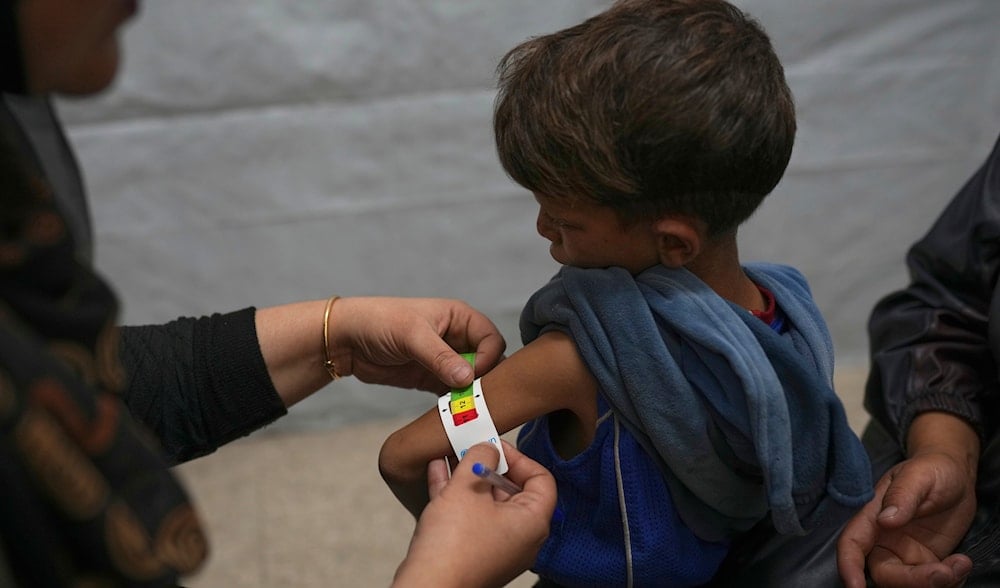UN reports soaring malnutrition cases in Gaza amid Israeli blockade
UNRWA reports a sharp increase in malnutrition cases in Gaza as "Israel" continues to starve the Strip, with aid groups warning of imminent famine due to the Israeli blockade and restricted humanitarian access.
-

A boy is checked for signs of malnutrition by a nurse at a medical clinic in Gaza City, on May 28, 2025. (AP Photo/Jehand Alshrafi)
The United Nations Relief and Works Agency for Palestine Refugees (UNRWA) has reported a sharp rise in malnutrition cases in its Gaza clinics, blaming the worsening conditions on "Israel’s" continued blockade of the Strip.
In a statement released Sunday, UNRWA said its medical teams in Gaza have recorded an alarming increase in malnutrition since March, when "Israel" blocked the entry of all humanitarian aid into the Strip.
Despite critical shortages in medical supplies and therapeutic food, the agency said its staff are working tirelessly to support the most vulnerable, particularly children and pregnant or breastfeeding women.
This UNRWA clinic in #Gaza has seen an increase in the number of malnutrition cases since March, when the siege imposed by the Government of Israel started.
— UNRWA (@UNRWA) July 13, 2025
UNRWA hasn’t been allowed to bring in any humanitarian aid since.
Despite a critical shortage in supplies essential for… pic.twitter.com/8C0Kf7THG7
Moreover, UNRWA Commissioner-General Philippe Lazzarini accused the Israeli occupation of deliberately obstructing humanitarian access and starving Gaza’s population. He stated that "Eight hundred starving civilians were shot and killed while trying to get a bit of food,” describing it as a form of collective punishment.
Lazzarini pointed out that during the temporary ceasefire earlier this year, the UN had successfully reversed famine trends, with 500 to 600 aid trucks entering daily. But following the resumption of hostilities, only four aid distribution points remain, compared to 400 during the ceasefire, most of them now unreachable for civilians under bombardment.
Highest malnutrition levels ever recorded in Gaza
Recent assessments by international medical groups, including Médecins Sans Frontières (MSF) and the World Health Organization (WHO), confirm UNRWA’s warnings. As of early July, MSF clinics in Gaza City and al-Mawasi report a nearly fourfold increase in malnutrition cases, jumping from 293 in May to 983 in July, including 326 children under the age of two.
WHO now estimates that an average of 112 children are hospitalized daily for malnutrition in Gaza. Since the beginning of 2025, over 18,700 children have required hospitalization for acute malnutrition, though most are unable to access treatment due to movement restrictions and constant airstrikes.
Additionally, at least 66 children have died from hunger-related causes this year, a number aid groups fear is a significant undercount. Without immediate and large-scale humanitarian access, aid agencies warn that Gaza faces an imminent famine and mass casualty event, especially among children under five, 71,000 of whom are projected to suffer from acute malnutrition over the coming year.
The World Food Programme (WFP) now warns that one in three Gazans are going entire days without food, with 470,000 people living under “catastrophic hunger” (IPC Phase 5) conditions, the highest classification before famine.
Most families in Gaza today are surviving on just one meal per day, and more than 700 pregnant and breastfeeding women are currently enrolled in outpatient feeding programs, as maternal malnutrition drives a spike in premature births and infant health complications.

 3 Min Read
3 Min Read











